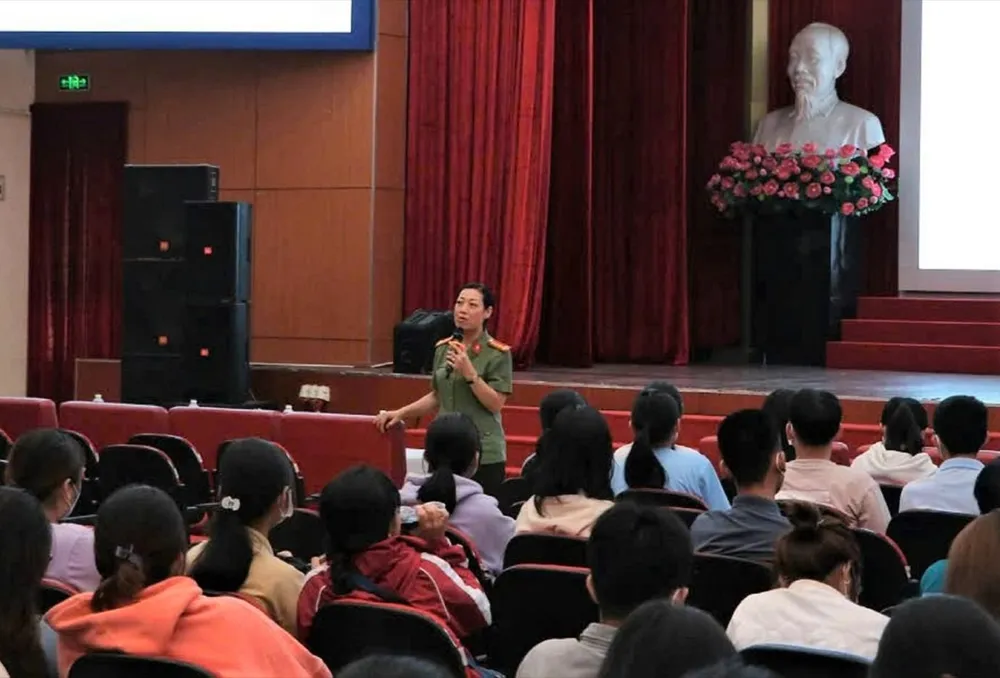Falling into the trap of studying abroad and international exchange programs.
In a complaint filed by the parents (father of student MT, Pham Ngoc Thach University of Medicine, Ho Chi Minh City) to the police and the school, they stated: “On Friday noon, May 23rd, MT called her mother and said that she had been selected by the school to participate in an international student exchange program in Germany and asked the family to deposit money into her account so that the bank statement could be submitted to the school for the exchange program application. From May 26th to 28th, the family transferred 7 billion VND into MT's account. Afterwards, the family became suspicious and asked an acquaintance working at the bank to check the balance in MT's account, and the result was that the account balance was gone.”
According to a representative from Pham Ngoc Thach University of Medicine, the university is currently not implementing any international study abroad or student exchange programs. Activities in collaboration with Johannes Gutenberg University Mainz (Germany) are only for students in the Vietnamese-German Faculty of Medicine.
Meanwhile, according to statistics from the University of Social Sciences and Humanities (Vietnam National University Ho Chi Minh City), the Student Affairs Department has received reports from many students who were scammed into transferring money due to threats related to a criminal case or tuition fees. The university has received the information and instructed students to report the incidents to the police for handling.
NTMT student shared: “At the end of January 2025, I received a call from someone claiming to be a police officer. The caller said, ‘You are a suspect in a money laundering case; you will be forced to drop out of school, and you might even go to jail…’ Then, this person asked me to transfer money to avoid prosecution. Because I was so scared and panicked, I transferred nearly 50 million VND.”
Ho Chi Minh City University of Technology and Education invited the Thu Duc City Police to discuss with students about skills to respond to scams.
Observations at numerous universities, includingFPT University, Ho Chi Minh City University of Medicine and Pharmacy, Ho Chi Minh City University of Transport, Ho Chi Minh City University of Technology (Vietnam National University Ho Chi Minh City), and Ton Duc Thang University, show that since the beginning of the year, scammers have sent many students notifications about scholarship offers, study abroad program acceptances, and invitations to reunions, along with requests for proof of account details, all with the aim of defrauding them.
The Ministry of Education and Training has requested provincial Departments of Education and Training and training institutions to disseminate information and warnings to students about fraudulent activities related to student exchange programs and international scholarships; and to advise students to seek information about scholarships and studying abroad from official sources.
The Ministry of Education and Training is implementing several scholarship programs and agreements using state budget funds to send students to study abroad, which are posted on the Ministry of Education and Training's electronic portal at https://moet.gov.vn and the electronic portal of the Department of International Cooperation, Ministry of Education and Training at https://icd.edu.vn.
Increase vigilance.
At the end of May, the Department of International Cooperation (Ministry of Education and Training) issued a document to provincial Departments of Education and Training and educational institutions warning about scams related to student exchange programs and studying abroad. According to the warning, recently, many forms of fraud have emerged related to student exchange programs, international summer camps, and scholarships for studying abroad.
Scammers often employ sophisticated tactics such as impersonating educational institutions, government agencies, or setting up fake websites and social media accounts to entice high school and university students to register, requesting participants to provide personal information, submit applications, and pay fees in order to steal information and embezzle funds from victims. Currently, some citizens have been scammed into paying hundreds of millions of dong in fees for study abroad scholarship programs.
According to a representative from the Ho Chi Minh City University of Technology (Vietnam National University Ho Chi Minh City), the university has recently detected numerous fake messages sent to students by scammers. Therefore, the university advises students to be extremely vigilant and verify the information when receiving suspicious or fraudulent messages.
All procedures for student scholarship applications and reviews are implemented through a rigorous system via email and the university's official electronic communication channels. These processes are monitored and regularly updated to students by relevant departments. If students notice any unusual activity, they should verify the information from reliable sources through the university's official channels or report it directly to the police.
According to Dr. Tran Thanh Thuong, Head of Admissions and Student Affairs (Ho Chi Minh City University of Technology and Education), some common forms of fraud that students need to be especially wary of include: scams promising easy jobs with high salaries (data entry, captcha typing, sales collaborators, etc.); scams via social media or impersonating acquaintances; financial investment scams, cryptocurrency scams; impersonating police officers, prosecutors, or bankers to call or send fake invitations to intimidate students about "involvement in a case" and request personal information or money transfers for verification; and offers of scholarships or 0% interest tuition loans.
Mr. Pham Thai Son, M.Sc. - Director of the Admissions and Communications Center, Ho Chi Minh City University of Industry and Trade:
Identifying and understanding scam tactics
First and foremost, students must remember: if you haven't done anything wrong, no one can accuse you of violating the law; if you haven't applied anywhere, you certainly won't get a scholarship; there's no such thing as an easy job with a high salary... At the same time, students should regularly monitor information on newspapers and television to recognize and remember fraudulent schemes and methods in order to be vigilant.
Currently, many students are losing money to scammers who trick them into believing they've been accepted into scholarship programs. However, students can spot these suspicious details if they pay attention: basic errors in scholarship invitation letters, such as the top of the letter stating the Ministry of Education and Training but the bottom being signed by the principal or department head; the seal being from the Ho Chi Minh City Department of Education and Training or another school; and no school requiring proof of income or bank statements.
Information about scholarship programs or student exchange and academic exchange programs is now clearly published on universities' websites and disseminated to each department and faculty, rather than being sent to individual students.
Ms. Nguyen Thi Kim Phung, M.Sc. - Deputy Director of the Center for Admissions and Business Relations, University of Finance and Marketing, Ho Chi Minh City:
Principles of preventing online fraud
Students must remember the principles of preventing online fraud. Specifically, do not provide your personal information to strangers; do not befriend or chat with strangers, especially those with attractive and appealing profile pictures; do not accept invitations to join groups without a clear purpose; do not access, log in to links, websites, applications, or open attachments from unknown or unverified senders.
Furthermore, no government officials, including those from the Ministry of Public Security, the prosecutor's office, the court, or any financial institution, will call to conduct investigations, request personal information, or ask for money. Therefore, students should not make advance bank transfers, deposits, or transfers to strangers under any circumstances; and should not be greedy for assets or gifts of unknown origin.
MSc. DANG KIEN CUONG - Head of Student Affairs Department, Ho Chi Minh City University of Agriculture and Forestry:
Let's share to raise awareness and vigilance.
Online scams via social media channels are becoming increasingly sophisticated and new tactics are constantly emerging. Therefore, to avoid falling into the trap of these scams, students need to raise their awareness, always verify the source of information, and not hastily trust opportunities that seem too good or too easy.
Students need to raise their awareness and knowledge about fraud by participating in courses and workshops on online safety, and thematic discussions related to legal matters.
Universities and educational institutions should regularly organize courses and workshops on how to identify and prevent various forms of fraud. Furthermore, when verifying that information is fraudulent, each student should widely share it to help spread awareness and vigilance within the student community and society.
THANH HUNG
Source: https://www.sggp.org.vn/ma-tran-lua-dao-bua-vay-sinh-vien-post799256.html








![[Photo] Prime Minister Pham Minh Chinh presides over a meeting on private sector economic development.](/_next/image?url=https%3A%2F%2Fvphoto.vietnam.vn%2Fthumb%2F1200x675%2Fvietnam%2Fresource%2FIMAGE%2F2025%2F12%2F20%2F1766237501876_thiet-ke-chua-co-ten-40-png.webp&w=3840&q=75)
























































































Comment (0)